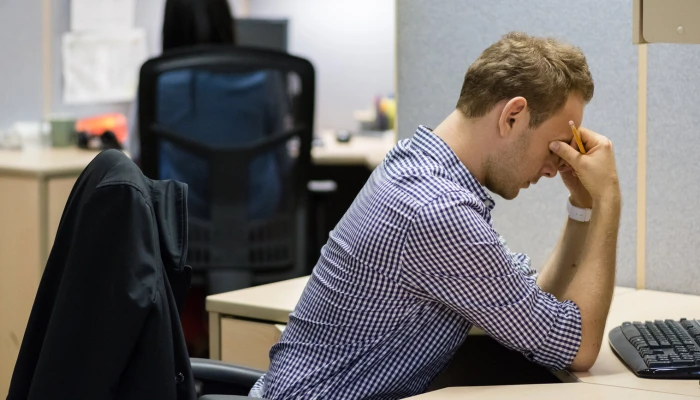Remembering the other pandemic on R U OK? Day
More than 3000 Australians a year, or around 8 people a day, take their own lives.1 This is higher than the rate of road deaths and, to put it in sharp perspective, a huge number compared to the number of deaths from Covid-19 nationally, reported as 770 at 9 September 2020.
Suicide remains the leading cause of death for 15-44 year olds in Australia. Concerningly, a far greater number – 65,000 – make a suicide attempt each year according to Lifeline. Men consistently make up 75 percent of deaths by suicide.
Suicide has devastating effects on loved ones, friends and communities. It is still to early to measure the impact of Covid-19 on suicide rates, but health professionals are concerned rates will rise. While the Victorian Coroner published data in August that the suicide had not increased so far this year,2 the Australian Medical Association recently issued a statement predicting a 25 percent increase in suicides due to the adverse impacts of Covid-19, with a third of those to be among young people, and that this higher rate may persist for some years depending on the long-term impact of the economic downturn.3
Further, a recent report from the Sydney University Brain and Mind Centre predicted the ongoing pandemic would continue to evolve and have a significant impact on the mental health of Australians. The report forecasted an increase of at least 13.7 percent of deaths by suicide over the next five years4 and an increase of 12.5 percent in self-harm attempts (indicative of suicide attempts) requiring hospitalisation. The prevalence of psychological distress was estimated to peak at 39.6 percent by December 2021. The key causal factors of psychological distress regarding Covid-19 were unemployment, social distancing and the threat of unemployment.5
Risk factors and signs
Unlike many other causes of death, suicide is considered to be preventable. So how do we as individuals contribute to bringing the number of deaths down? Knowing the signs and how to respond when you recognise them is the first step. The ability to listen and have a supportive conversation with someone who is thinking about suicide can make an enormous difference and may prevent them from taking their life.
Risk factors for suicide include:
- when people have experienced a significant life event such as a relationship breakdown or loss of a loved one
- financial difficulty
- family violence or family history of suicide
- chronic illness or a significant health issue
- workplace stress, or ongoing stress
- mental illness and/or alcohol or drug problems
- loneliness and social isolation.
The simplest action is to reach out and ask people if they are okay – however many of us feel uncomfortable. We may feel that we don’t have the skills to ask and lack confidence in knowing what to say. We worry how the person may respond, or even what we should do if they say they are not okay.
It's important not to underestimate your ability to help a suicidal person – knowing the signs is a good first step. These might include:
- talking about death or suicide
- risk-taking behaviour
- withdrawing from friends, family or the community
- increased alcohol and/or drug use
- dramatic mood swings
- no sense of purpose in life, or no reason for living
- their concern that they are a burden
- a change in their online behaviour
- loss of interest in their appearance or personal hygiene.
How to have the conversation
If you have noticed some of these signs in a colleague, friend or loved one you can start a conversation by:
- letting them know you are concerned about them, and want to help
- being direct, e.g. “Are you having thoughts of suicide?”, or “Are you thinking of taking your life by suicide?” – this will not influence a person to act on suicidal thoughts, but instead provide them the chance to talk about their problems and show them that you care; even though you may be feeling panicked at this point, do your best to appear calm and empathetic, this will be reassuring for the person
- not agreeing to keep their suicidal thoughts a secret
- telling them there are other options
- encouraging them to seek professional help, e.g. making an appointment with their GP, or accessing the organisation's EAP
- asking them if there is a family member or another friend you can contact for them
- contacting a specialist helpline, they will often be able to talk directly with the person or they can provide you with further advice.
If they reveal they have made a plan and have access to the means to take their life:
- don’t leave them alone
- take away any objects that they could harm themselves with
- contact a specialist helpline – they will often be able to talk directly with the person or they can provide you with further advice
- ask them if you can contact a family member or friend for support
- call 000, tell them you are with a suicidal person and they have a plan to take their life
- call the emergency department at your local hospital.
Your actions can be very powerful in helping that person seek professional help. Thank them for their honesty and follow up with them.
Helping someone who is suicidal can cause you to experience a range of emotions. It is important to make sure you take care of yourself. Speak with a family member or a friend, or ring a helpline. If you find you are struggling, speak with your GP or mental health professional.
Specialist helplines
- Lifeline: 13 11 14
- Suicide Call Back Service: 1300 659 467
- Kids Helpline: 1800 55 1800
- Mens Helpline: 1300 78 99 78
References
- Australian Government Department of Health. Suicide Prevention https://www.health.gov.au/health-topics/suicide-prevention extracted 24 July 2020
- The Guardian (27 August 2020). Suicides haven't risen in Victoria in 2020 but Covid welfare cuts ahead cause concern. [available at https://www.theguardian.com/australia-news/2020/aug/27/victorian-suicide-rates-lower-than-feared-but-coming-covid-welfare-cuts-cause-concern]
- Australian Medical Association. Joint statement: Covid-19 impact likely to lead to increased rates of suicide and mental illness. https://ama.com.au/media/joint-statement-covid-19-impact-likely-lead-increased-rates-suicide-and-mental-illness extracted 24 July 2020
- Atkinson J, Skinner A, Lawson K, Song Y, Hickie I (2020). Road to recovery: restoring Australia's mental wealth. The University of Sydney Brain and Mind Centre [available at https://www.sydney.edu.au/content/dam/corporate/documents/brain-and-mind-centre/road-to-recovery_brain-and-mind-centre.pdf]
- Lifeline. Data & Statistics. https://www.lifeline.org.au/resources/data-and-statistics/


